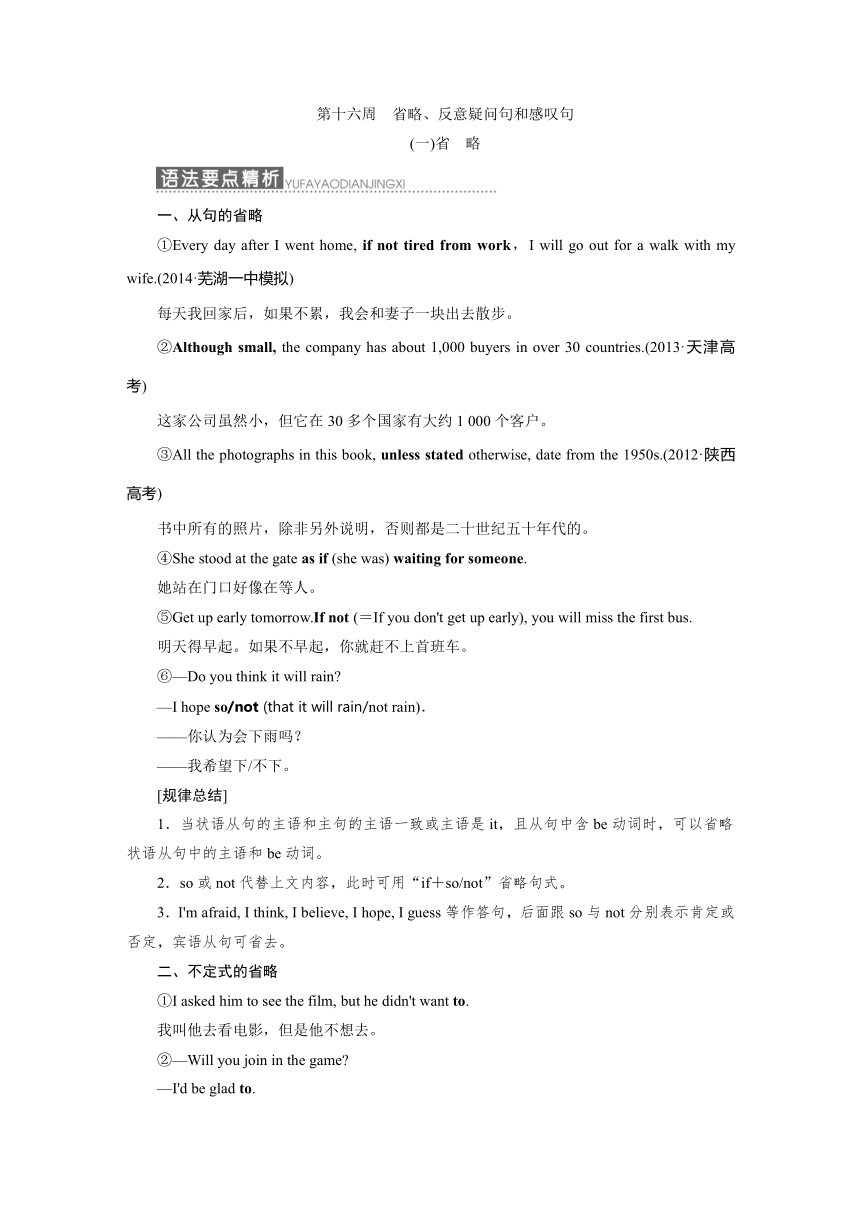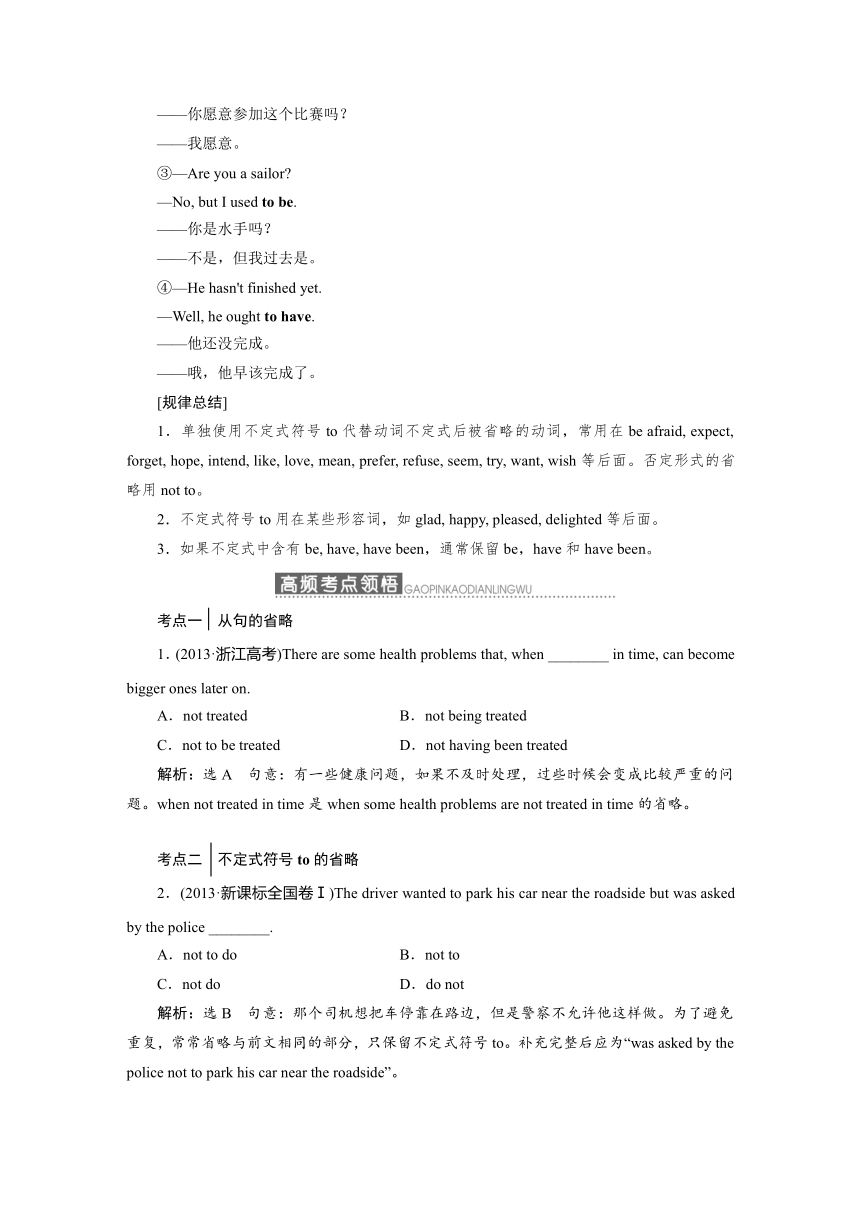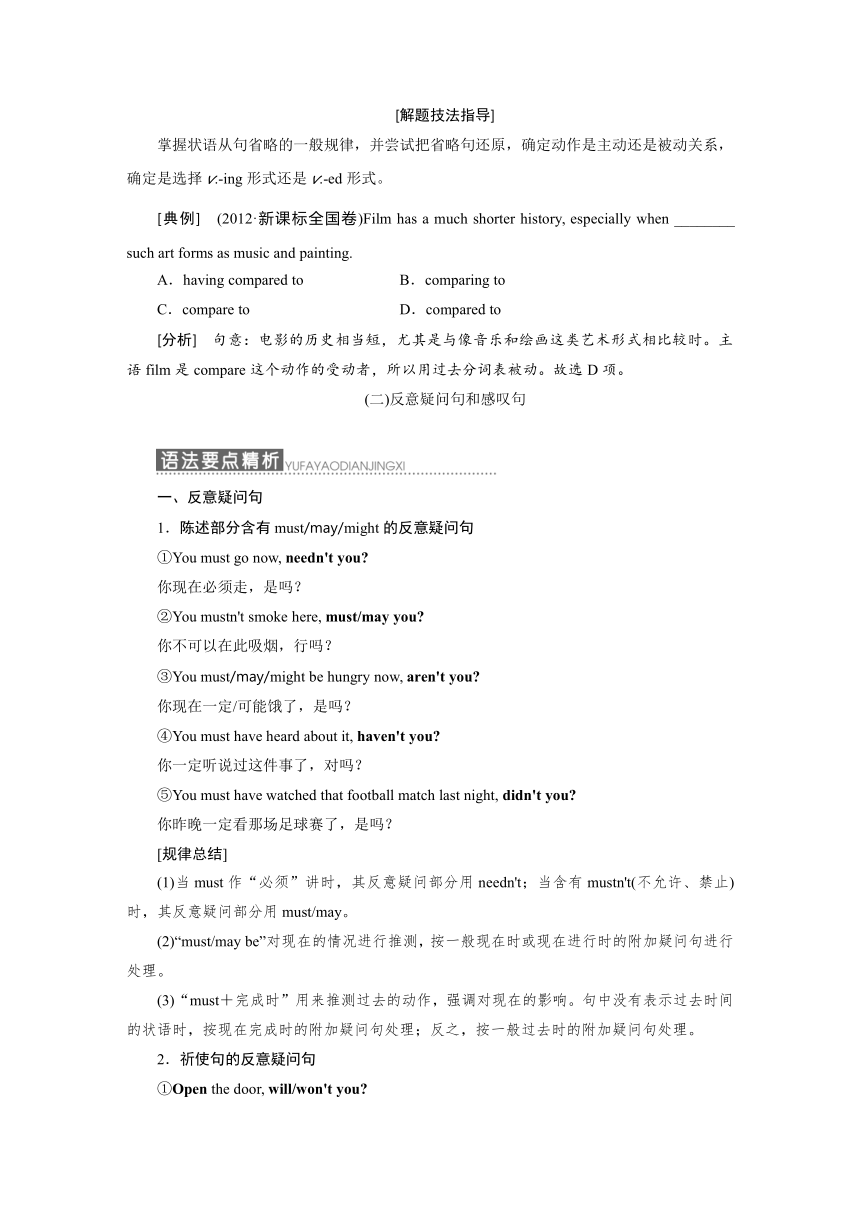【每周一讲,个个击破】2015《三维设计》高考英语(江苏专用)大一轮语法专题:第十六周 省略、反意疑问句和感叹句(语法要点精析+高频考点领悟+专题过关检测)
文档属性
| 名称 | 【每周一讲,个个击破】2015《三维设计》高考英语(江苏专用)大一轮语法专题:第十六周 省略、反意疑问句和感叹句(语法要点精析+高频考点领悟+专题过关检测) |  | |
| 格式 | zip | ||
| 文件大小 | 102.5KB | ||
| 资源类型 | 教案 | ||
| 版本资源 | 通用版 | ||
| 科目 | 英语 | ||
| 更新时间 | 2014-07-24 07:35:29 | ||
图片预览



文档简介
第十六周 省略、反意疑问句和感叹句
(一)省 略
一、从句的省略
①Every day after I w ( http: / / www.21cnjy.com )ent home, if not tired from work,I will go out for a walk with my wife.(2014·芜湖一中模拟)
每天我回家后,如果不累,我会和妻子一块出去散步。
②Although small, the ( http: / / www.21cnjy.com )company has about 1,000 buyers in over 30 countries.(2013·天津高考)
这家公司虽然小,但它在30多个国家有大约1 000个客户。
③All the photographs ( http: / / www.21cnjy.com )in this book, unless stated otherwise, date from the 1950s.(2012·陕西高考)
书中所有的照片,除非另外说明,否则都是二十世纪五十年代的。
④She stood at the gate as if (she was) waiting for someone.
她站在门口好像在等人。
⑤Get up early ( http: / / www.21cnjy.com ) tomorrow.If not (=If you don't get up early), you will miss the first bus.
明天得早起。如果不早起,你就赶不上首班车。
⑥—Do you think it will rain
—I hope so/not (that it will rain/not rain).
——你认为会下雨吗?
——我希望下/不下。
1.当状语从句的主语和主句的主语一致或主语是it,且从句中含be动词时,可以省略状语从句中的主语和be动词。
2.so或not代替上文内容,此时可用“if+so/not”省略句式。
3.I'm afraid, I thi ( http: / / www.21cnjy.com )nk, I believe, I hope, I guess等作答句,后面跟so与not分别表示肯定或否定,宾语从句可省去。
二、不定式的省略
①I asked him to see the film, but he didn't want to.
我叫他去看电影,但是他不想去。
②—Will you join in the game
—I'd be glad to.
——你愿意参加这个比赛吗?
——我愿意。
③—Are you a sailor
—No, but I used to be.
——你是水手吗?
——不是,但我过去是。
④—He hasn't finished yet.
—Well, he ought to have.
——他还没完成。
——哦,他早该完成了。
1.单独使用不定式符号to代替动词 ( http: / / www.21cnjy.com )不定式后被省略的动词,常用在be afraid, expect, forget, hope, intend, like, love, mean, prefer, refuse, seem, try, want, wish等后面。否定形式的省略用not to。
2.不定式符号to用在某些形容词,如glad, happy, pleased, delighted等后面。
3.如果不定式中含有be, have, have been,通常保留be,have和have been。
考点一 从句的省略
1.(2013·浙江高考)Ther ( http: / / www.21cnjy.com )e are some health problems that, when ________ in time, can become bigger ones later on.
A.not treated B.not being treated
C.not to be treated D.not having been treated
解析:选A 句意:有一些健康问题,如果不及时 ( http: / / www.21cnjy.com )处理,过些时候会变成比较严重的问题。when not treated in time是when some health problems are not treated in time的省略。
考点二 不定式符号to的省略
2.(2013·新课标全国 ( http: / / www.21cnjy.com )卷Ⅰ)The driver wanted to park his car near the roadside but was asked by the police ________.
A.not to do B.not to
C.not do D.do not
解析:选B 句意:那个司 ( http: / / www.21cnjy.com )机想把车停靠在路边,但是警察不允许他这样做。为了避免重复,常常省略与前文相同的部分,只保留不定式符号to。补充完整后应为“was asked by the police not to park his car near the roadside”。
[解题技法指导]
掌握状语从句省略的一般规律,并尝试把省略句还原,确定动作是主动还是被动关系,确定是选择v. ing形式还是v. ed形式。
[典例] (2012·新课标全国卷)F ( http: / / www.21cnjy.com )ilm has a much shorter history, especially when ________ such art forms as music and painting.
A.having compared to B.comparing to
C.compare to D.compared to
[分析] 句意:电影的历史相当短,尤其 ( http: / / www.21cnjy.com )是与像音乐和绘画这类艺术形式相比较时。主语film是compare这个动作的受动者,所以用过去分词表被动。故选D项。
(二)反意疑问句和感叹句
一、反意疑问句
1.陈述部分含有must/may/might的反意疑问句
①You must go now, needn't you
你现在必须走,是吗?
②You mustn't smoke here, must/may you
你不可以在此吸烟,行吗?
③You must/may/might be hungry now, aren't you
你现在一定/可能饿了,是吗?
④You must have heard about it, haven't you
你一定听说过这件事了,对吗?
⑤You must have watched that football match last night, didn't you
你昨晚一定看那场足球赛了,是吗?
(1)当must作“必须”讲时,其反意疑问部分用needn't;当含有mustn't(不允许、禁止)时,其反意疑问部分用must/may。
(2)“must/may be”对现在的情况进行推测,按一般现在时或现在进行时的附加疑问句进行处理。
(3)“must+完成时”用来推测 ( http: / / www.21cnjy.com )过去的动作,强调对现在的影响。句中没有表示过去时间的状语时,按现在完成时的附加疑问句处理;反之,按一般过去时的附加疑问句处理。
2.祈使句的反意疑问句
①Open the door, will/won't you
打开门,好吗?
②Let's go out for a walk, shall we
我们出去散步,好吗?
③Let us go home now, will/won't you
现在,(您)让我们回家,好吗?
[规律总结]
祈使句后的附加问句不表示反意,而表示一种语气。其结构为:
(1)否定祈使句,+will you
(2)肯定祈使句,+will/won't you
(3)Let's ...,+shall we
(4)Let us ...,+will/won't you
3.陈述部分含有宾语从句的反意疑问句
①He said that he would come to my birthday party, didn't he
他说他要来参加我的生日聚会,是吗?
②I don't believe he will succeed, will he
我认为他不会成功,会吗?
③Tom doesn't believe Jane will succeed, does he
汤姆不相信简会成功,对吗?
(1)当陈述部分带有宾语从句时,疑问部分常和主句保持一致。
(2)陈述部分的主句谓语动词是think ( http: / / www.21cnjy.com ), believe, suppose, guess, expect, imagine,且主句主语为第一人称时,疑问部分的主语和时态与宾语从句的主语和时态保持一致;主句的主语为第二、三人称时,后面的疑问部分与主句的主语、谓语一致。注意陈述部分的否定转移现象。
4.陈述部分含有否定含义及否定词的反意疑问句
①He could hardly walk without a stick, could he
没有拐杖他几乎不能走路,是吗?
②Tom dislikes playing tennis, doesn't he
汤姆不喜欢打网球,是吗?
③It's unfair, isn't it
那不公平,是吗?
1.如果陈述部分含有由表示“否定”意义的前缀构成的词,其反意疑问部分一般用否定式。
2.陈述部分含有否定词或半否定词的反意疑问句
当陈述部分带有seldom, har ( http: / / www.21cnjy.com )dly, scarcely, never, few, little, nothing, nobody等否定词或半否定词时,疑问部分的动词用肯定形式。
二、感叹句
①What a clever boy he is!
=How clever the boy is!
多聪明的孩子啊!
②What beautiful flowers these are!
=How beautiful these flowers are!
这些花多美啊!
③What sweet water it is!
这水可真甜呀!
④How fast he is running!
他跑得真快!
感叹句的基本构成形式
(1)What(+a/an)+形容词+名词+主语+谓语!
(2)How+形容词+a/an+可数名词单数+主语+谓语!
(3)How+形容词/副词+主语+谓语!
考点一 反意疑问句
1.(2012·江苏高考)There ( http: / / www.21cnjy.com )is little doubt in your mind that he is innocent, ________?
A.is there B.isn't there
C.is he D.isn't he
解析:选A 陈述部分中含有表示 ( http: / / www.21cnjy.com )否定意义的词little,所以简短问句用肯定形式,首先排除B、D两项;陈述部分为there be句型,故简短问句应用is there,故选A项。
2.(2011·重庆高考)I told ( http: / / www.21cnjy.com ) them not everybody could run as fast as you did, ______?
A.could he B.didn't I
C.didn't you D.could they
解析:选B 句意:我告诉他们并非每个人都 ( http: / / www.21cnjy.com )可以跑得和你一样快,不是吗? 在反意疑问句中,若陈述部分是一个主从复合句, 附加疑问句一般要与主句一致。 本句含有一个宾语从句且主句为“ I told them ...”, 故答案选B项。
考点二 感叹句
3.(2011·辽宁高考)______ a strange plant! I've never seen it before.
A.Which B.What
C.How D.Whether
解析:选B 句意:多么奇怪的 ( http: / / www.21cnjy.com )植物啊!我以前从没见过。此处为“What+a/an +adj. + n. +it is/was”的省略结构,故B项正确。
1.(2014·合肥一中模拟)Ever ( http: / / www.21cnjy.com )y swimmer wants to be a champion swimmer. If you ________, you've got to start young.
A.do B.want
C.want to D.want to be
解析:选D 句意表明“如果你想成为游泳 ( http: / / www.21cnjy.com )冠军,你必须从小开始(训练)。”完整的if从句为:If you want to be a champion swimmer,此处省略了a champion swimmer,当不定式后有be时,be不可省略。
2.(2014·南京模拟)—The old store enjoys a good reputation in this area.
—Can't agree more.Th ( http: / / www.21cnjy.com )ere are very few, ________, complaints about their service.
A.if any B.if so
C.if anything D.if ever
解析:选A 句意:“在这个地区,那个老商店享 ( http: / / www.21cnjy.com )有良好的声誉。”“非常同意。对他们的服务的抱怨如果有的话,也是很少的”。if any“若有的话”,符合语境。
3.(2014·北京西城模拟)A p ( http: / / www.21cnjy.com )erson, when ________, can often do what is normally beyond his ability.
A.challenged B.challenges
C.challenging D.to challenge
解析:选A 句意:当一个人遇到挑战时,他往往能做超越他能力的事情。时间状语从句补充完整为“when he is challenged”。
4.(2014·安徽名校联考)—What a pity that you didn't attend Jane's wedding!
—I intended ________, but you know my little son is always attached to me.
A.to B.to have
C.to be D.to attend
解析:选B 句意:“你没有参加简的婚礼, ( http: / / www.21cnjy.com )真遗憾!”“我本打算参加的,但你知道我的小儿子总是粘着我。”根据语意可知,此处表示过去本打算做某事而未做,因此应用intend to have done。在不定式中,用不定式符号to代替动词不定式后被省略的重复部分,但当省略的不定式中有作助动词用的have或be的任何形式时,to后要保留have或be。
5.(2014·厦门适应性考试)M ( http: / / www.21cnjy.com )r. Wang must have watched the film So Young last night,________?
A.mustn't he B.hasn't he
C.didn't he D.needn't he
解析:选C 句意:王先生昨天晚上肯定 ( http: / / www.21cnjy.com )看过了电影《致我们终将逝去的青春》,是吧?如情态动词must+have done表对过去的推测且有明显的表示过去的时间状语时,用did构成反意疑问句;根据反意疑问句中的前肯后否原则,所以答案为C。
6.(2014·齐鲁名校联合测试)Nothing that you say can change his mind,________?
A.do you B.don't you
C.can it D.can't it
解析:选C 句意:你说什么都不可能改变 ( http: / / www.21cnjy.com )他的主意,难道不是吗?当陈述部分的主语是不定代词something, nothing等时,反意疑问部分的主语要用it。句中的Nothing是表示否定含义的词,疑问部分用肯定形式,再根据谓语can可知反意疑问部分应用can it。
7.(2014·徐州质量检测 ( http: / / www.21cnjy.com ))I don't think Linda could have done such a stupid thing last night,________?
A.do I B.didn't she
C.did she D.don't I
解析:选C 在反意疑问句中 ( http: / / www.21cnjy.com ),当陈述部分是“I don't think/suppose/expect/believe等+宾语从句”结构时,附加问句应与从句一致,同时要注意陈述部分的否定转移现象。分析本题的句子结构可知应选C。
8.(2014·温州模拟)________these brochures among the tourists before you leave, will you
A.Having distributed B.To distribute
C.Distribute D.Distributing
解析:选C 句意:在你离开前把这些小册子分发给游客们,好吗?根据will you可知,空处应填动词原形构成祈使句,选C。
(一)省 略
一、从句的省略
①Every day after I w ( http: / / www.21cnjy.com )ent home, if not tired from work,I will go out for a walk with my wife.(2014·芜湖一中模拟)
每天我回家后,如果不累,我会和妻子一块出去散步。
②Although small, the ( http: / / www.21cnjy.com )company has about 1,000 buyers in over 30 countries.(2013·天津高考)
这家公司虽然小,但它在30多个国家有大约1 000个客户。
③All the photographs ( http: / / www.21cnjy.com )in this book, unless stated otherwise, date from the 1950s.(2012·陕西高考)
书中所有的照片,除非另外说明,否则都是二十世纪五十年代的。
④She stood at the gate as if (she was) waiting for someone.
她站在门口好像在等人。
⑤Get up early ( http: / / www.21cnjy.com ) tomorrow.If not (=If you don't get up early), you will miss the first bus.
明天得早起。如果不早起,你就赶不上首班车。
⑥—Do you think it will rain
—I hope so/not (that it will rain/not rain).
——你认为会下雨吗?
——我希望下/不下。
1.当状语从句的主语和主句的主语一致或主语是it,且从句中含be动词时,可以省略状语从句中的主语和be动词。
2.so或not代替上文内容,此时可用“if+so/not”省略句式。
3.I'm afraid, I thi ( http: / / www.21cnjy.com )nk, I believe, I hope, I guess等作答句,后面跟so与not分别表示肯定或否定,宾语从句可省去。
二、不定式的省略
①I asked him to see the film, but he didn't want to.
我叫他去看电影,但是他不想去。
②—Will you join in the game
—I'd be glad to.
——你愿意参加这个比赛吗?
——我愿意。
③—Are you a sailor
—No, but I used to be.
——你是水手吗?
——不是,但我过去是。
④—He hasn't finished yet.
—Well, he ought to have.
——他还没完成。
——哦,他早该完成了。
1.单独使用不定式符号to代替动词 ( http: / / www.21cnjy.com )不定式后被省略的动词,常用在be afraid, expect, forget, hope, intend, like, love, mean, prefer, refuse, seem, try, want, wish等后面。否定形式的省略用not to。
2.不定式符号to用在某些形容词,如glad, happy, pleased, delighted等后面。
3.如果不定式中含有be, have, have been,通常保留be,have和have been。
考点一 从句的省略
1.(2013·浙江高考)Ther ( http: / / www.21cnjy.com )e are some health problems that, when ________ in time, can become bigger ones later on.
A.not treated B.not being treated
C.not to be treated D.not having been treated
解析:选A 句意:有一些健康问题,如果不及时 ( http: / / www.21cnjy.com )处理,过些时候会变成比较严重的问题。when not treated in time是when some health problems are not treated in time的省略。
考点二 不定式符号to的省略
2.(2013·新课标全国 ( http: / / www.21cnjy.com )卷Ⅰ)The driver wanted to park his car near the roadside but was asked by the police ________.
A.not to do B.not to
C.not do D.do not
解析:选B 句意:那个司 ( http: / / www.21cnjy.com )机想把车停靠在路边,但是警察不允许他这样做。为了避免重复,常常省略与前文相同的部分,只保留不定式符号to。补充完整后应为“was asked by the police not to park his car near the roadside”。
[解题技法指导]
掌握状语从句省略的一般规律,并尝试把省略句还原,确定动作是主动还是被动关系,确定是选择v. ing形式还是v. ed形式。
[典例] (2012·新课标全国卷)F ( http: / / www.21cnjy.com )ilm has a much shorter history, especially when ________ such art forms as music and painting.
A.having compared to B.comparing to
C.compare to D.compared to
[分析] 句意:电影的历史相当短,尤其 ( http: / / www.21cnjy.com )是与像音乐和绘画这类艺术形式相比较时。主语film是compare这个动作的受动者,所以用过去分词表被动。故选D项。
(二)反意疑问句和感叹句
一、反意疑问句
1.陈述部分含有must/may/might的反意疑问句
①You must go now, needn't you
你现在必须走,是吗?
②You mustn't smoke here, must/may you
你不可以在此吸烟,行吗?
③You must/may/might be hungry now, aren't you
你现在一定/可能饿了,是吗?
④You must have heard about it, haven't you
你一定听说过这件事了,对吗?
⑤You must have watched that football match last night, didn't you
你昨晚一定看那场足球赛了,是吗?
(1)当must作“必须”讲时,其反意疑问部分用needn't;当含有mustn't(不允许、禁止)时,其反意疑问部分用must/may。
(2)“must/may be”对现在的情况进行推测,按一般现在时或现在进行时的附加疑问句进行处理。
(3)“must+完成时”用来推测 ( http: / / www.21cnjy.com )过去的动作,强调对现在的影响。句中没有表示过去时间的状语时,按现在完成时的附加疑问句处理;反之,按一般过去时的附加疑问句处理。
2.祈使句的反意疑问句
①Open the door, will/won't you
打开门,好吗?
②Let's go out for a walk, shall we
我们出去散步,好吗?
③Let us go home now, will/won't you
现在,(您)让我们回家,好吗?
[规律总结]
祈使句后的附加问句不表示反意,而表示一种语气。其结构为:
(1)否定祈使句,+will you
(2)肯定祈使句,+will/won't you
(3)Let's ...,+shall we
(4)Let us ...,+will/won't you
3.陈述部分含有宾语从句的反意疑问句
①He said that he would come to my birthday party, didn't he
他说他要来参加我的生日聚会,是吗?
②I don't believe he will succeed, will he
我认为他不会成功,会吗?
③Tom doesn't believe Jane will succeed, does he
汤姆不相信简会成功,对吗?
(1)当陈述部分带有宾语从句时,疑问部分常和主句保持一致。
(2)陈述部分的主句谓语动词是think ( http: / / www.21cnjy.com ), believe, suppose, guess, expect, imagine,且主句主语为第一人称时,疑问部分的主语和时态与宾语从句的主语和时态保持一致;主句的主语为第二、三人称时,后面的疑问部分与主句的主语、谓语一致。注意陈述部分的否定转移现象。
4.陈述部分含有否定含义及否定词的反意疑问句
①He could hardly walk without a stick, could he
没有拐杖他几乎不能走路,是吗?
②Tom dislikes playing tennis, doesn't he
汤姆不喜欢打网球,是吗?
③It's unfair, isn't it
那不公平,是吗?
1.如果陈述部分含有由表示“否定”意义的前缀构成的词,其反意疑问部分一般用否定式。
2.陈述部分含有否定词或半否定词的反意疑问句
当陈述部分带有seldom, har ( http: / / www.21cnjy.com )dly, scarcely, never, few, little, nothing, nobody等否定词或半否定词时,疑问部分的动词用肯定形式。
二、感叹句
①What a clever boy he is!
=How clever the boy is!
多聪明的孩子啊!
②What beautiful flowers these are!
=How beautiful these flowers are!
这些花多美啊!
③What sweet water it is!
这水可真甜呀!
④How fast he is running!
他跑得真快!
感叹句的基本构成形式
(1)What(+a/an)+形容词+名词+主语+谓语!
(2)How+形容词+a/an+可数名词单数+主语+谓语!
(3)How+形容词/副词+主语+谓语!
考点一 反意疑问句
1.(2012·江苏高考)There ( http: / / www.21cnjy.com )is little doubt in your mind that he is innocent, ________?
A.is there B.isn't there
C.is he D.isn't he
解析:选A 陈述部分中含有表示 ( http: / / www.21cnjy.com )否定意义的词little,所以简短问句用肯定形式,首先排除B、D两项;陈述部分为there be句型,故简短问句应用is there,故选A项。
2.(2011·重庆高考)I told ( http: / / www.21cnjy.com ) them not everybody could run as fast as you did, ______?
A.could he B.didn't I
C.didn't you D.could they
解析:选B 句意:我告诉他们并非每个人都 ( http: / / www.21cnjy.com )可以跑得和你一样快,不是吗? 在反意疑问句中,若陈述部分是一个主从复合句, 附加疑问句一般要与主句一致。 本句含有一个宾语从句且主句为“ I told them ...”, 故答案选B项。
考点二 感叹句
3.(2011·辽宁高考)______ a strange plant! I've never seen it before.
A.Which B.What
C.How D.Whether
解析:选B 句意:多么奇怪的 ( http: / / www.21cnjy.com )植物啊!我以前从没见过。此处为“What+a/an +adj. + n. +it is/was”的省略结构,故B项正确。
1.(2014·合肥一中模拟)Ever ( http: / / www.21cnjy.com )y swimmer wants to be a champion swimmer. If you ________, you've got to start young.
A.do B.want
C.want to D.want to be
解析:选D 句意表明“如果你想成为游泳 ( http: / / www.21cnjy.com )冠军,你必须从小开始(训练)。”完整的if从句为:If you want to be a champion swimmer,此处省略了a champion swimmer,当不定式后有be时,be不可省略。
2.(2014·南京模拟)—The old store enjoys a good reputation in this area.
—Can't agree more.Th ( http: / / www.21cnjy.com )ere are very few, ________, complaints about their service.
A.if any B.if so
C.if anything D.if ever
解析:选A 句意:“在这个地区,那个老商店享 ( http: / / www.21cnjy.com )有良好的声誉。”“非常同意。对他们的服务的抱怨如果有的话,也是很少的”。if any“若有的话”,符合语境。
3.(2014·北京西城模拟)A p ( http: / / www.21cnjy.com )erson, when ________, can often do what is normally beyond his ability.
A.challenged B.challenges
C.challenging D.to challenge
解析:选A 句意:当一个人遇到挑战时,他往往能做超越他能力的事情。时间状语从句补充完整为“when he is challenged”。
4.(2014·安徽名校联考)—What a pity that you didn't attend Jane's wedding!
—I intended ________, but you know my little son is always attached to me.
A.to B.to have
C.to be D.to attend
解析:选B 句意:“你没有参加简的婚礼, ( http: / / www.21cnjy.com )真遗憾!”“我本打算参加的,但你知道我的小儿子总是粘着我。”根据语意可知,此处表示过去本打算做某事而未做,因此应用intend to have done。在不定式中,用不定式符号to代替动词不定式后被省略的重复部分,但当省略的不定式中有作助动词用的have或be的任何形式时,to后要保留have或be。
5.(2014·厦门适应性考试)M ( http: / / www.21cnjy.com )r. Wang must have watched the film So Young last night,________?
A.mustn't he B.hasn't he
C.didn't he D.needn't he
解析:选C 句意:王先生昨天晚上肯定 ( http: / / www.21cnjy.com )看过了电影《致我们终将逝去的青春》,是吧?如情态动词must+have done表对过去的推测且有明显的表示过去的时间状语时,用did构成反意疑问句;根据反意疑问句中的前肯后否原则,所以答案为C。
6.(2014·齐鲁名校联合测试)Nothing that you say can change his mind,________?
A.do you B.don't you
C.can it D.can't it
解析:选C 句意:你说什么都不可能改变 ( http: / / www.21cnjy.com )他的主意,难道不是吗?当陈述部分的主语是不定代词something, nothing等时,反意疑问部分的主语要用it。句中的Nothing是表示否定含义的词,疑问部分用肯定形式,再根据谓语can可知反意疑问部分应用can it。
7.(2014·徐州质量检测 ( http: / / www.21cnjy.com ))I don't think Linda could have done such a stupid thing last night,________?
A.do I B.didn't she
C.did she D.don't I
解析:选C 在反意疑问句中 ( http: / / www.21cnjy.com ),当陈述部分是“I don't think/suppose/expect/believe等+宾语从句”结构时,附加问句应与从句一致,同时要注意陈述部分的否定转移现象。分析本题的句子结构可知应选C。
8.(2014·温州模拟)________these brochures among the tourists before you leave, will you
A.Having distributed B.To distribute
C.Distribute D.Distributing
解析:选C 句意:在你离开前把这些小册子分发给游客们,好吗?根据will you可知,空处应填动词原形构成祈使句,选C。
同课章节目录
